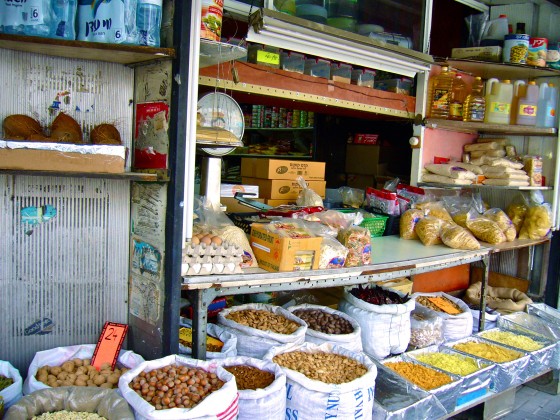 In Israel the organic food market is still comparatively small and underdeveloped.
In Israel the organic food market is still comparatively small and underdeveloped.
According to the Israeli newspaper Haaretz organic food only comprises one and half percent of Israel’s agricultural output. A whopping 90% of it is exported abroad, mainly to European markets.
An annual Agriculture Ministry survey in 2011 discovered that 37.4% of the organic produce sold in Israeli stores was mislabeled. The produce may have contained pesticides or in other ways fallen short of the ministry’s organic regulations. This may be part of the problem.
Organic chain supermarkets the paper points out struggle to compete with private farmers and open markets. Shuks [or markets] such as Machane Yehuda in Jerusalem, are cultural symbols and centers in Israel, each brimming with its own traditions.
It’s impossible for a store to replicate the diversity, communal chaos, smells and hustle, the haggling and booming voices of the shuk. Even beyond traditional shuks, through budding programs like Community Supported Agriculture (CSA) Israeli farmers can now take their produce directly to consumers without the hassle of a middleman, which generally provides superior freshness for the customer and higher profits for the farmer.
Despite these difficulties five major Israeli chains specializing in organic food emerged over the past two decades.
The oldest, Nitzat Haduvdevan (The Cherry Bud in English), opened its first branch in 1986. They now have 17 stores throughout Israel. Next came Teva Castel, established in 1999, which now operates five outlets in and around Tel Aviv. These were later joined by Eden Teva Market, with 20 locations including nine branches within mega supermarkets.
There are also the eight venues of Organic Market, which was bought up by Super-Sol in 2011. The fifth and final company is a sub-organization within Super-Sol called “Green.” It is essentially its own section within 15 regular Super-Sol supermarkets.
Prices for organic produce from a store are drastically more expensive than their conventionally grown counterparts or organic produce purchased at a market. As with many industrialized food distributors, the larger companies typically offer the lowest prices. Of the five Israeli chains Super-Sol’s ‘Green’ generally offers the cheapest organic produce. Organic cucumbers that cost merely NIS 6 per kilo at ‘Green’ cost NIS 13 per kilo in Organic Market – a 116% difference.
While offering organic produce in stores and major outlets are a step towards public awareness and general accessibility, CSAs and open markets provide the most sustainable outlet for Israel’s organic market to continue expanding.
In a culture where the shopper’s battle cry is “Ani lo friar!” (I am not a sucker!”), hunting for the best and cheapest from a diverse spectrum of sellers is half the fun.
::Haaretz
Images by Wikimedia Commons and Leigh Cuen





You know who will be the real friars? Israeli children, who sadly will develop cancer and other chronic illnesses from all the pesticide exposure. Not just the pesticides on the vegetables and fruit they are eating, but from the sprays sent down on them while they play in the wheat fields. 🙁